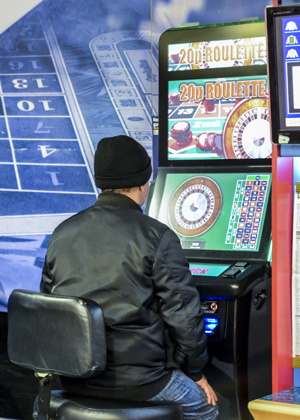Gambling Advertising Self Imposed TV Ban, Will It Work and Does It Go Far Enough?
 In the world of politics, it is almost the done thing to disagree with the other side on principle. Yet few subjects have united both sides of the aisle in recent years as much as the desire to curb the influence of betting companies through advertising. The Labour Party’s Deputy Leader Tom Watson has been a driving force behind their pledges and promises to reign in the gambling industry, should they win the next general election, for example.
In the world of politics, it is almost the done thing to disagree with the other side on principle. Yet few subjects have united both sides of the aisle in recent years as much as the desire to curb the influence of betting companies through advertising. The Labour Party’s Deputy Leader Tom Watson has been a driving force behind their pledges and promises to reign in the gambling industry, should they win the next general election, for example.
In recent months it has been the industry itself that has decided to impose limits on its influence. In December of 2018, for example, the Remote Gambling Association announced that its members would be voluntarily ceasing the broadcast of gambling adverts during live sporting events. It came after Sky, the broadcaster, had announced that it would be limiting gambling adverts on its airways to one per advert break on any channels it had control of. But is it right that gambling adverts should be restricted?
Gambling Adverts – Culture Of Normalisation

One of the predominant reasons that the critics of gambling adverts want them to be limited is due to the prevailing culture of normalisation. Marc Etches, the Chief Executive of GambleAware, pointed out that younger people are growing up in a world where the internet and technology are both ‘ever-present’ factors.
The combination of that and the seemingly constant stream of gambling adverts on TV in the past mean that the world of gambling is entirely normal to young people, with one in eight 11 to 16-year-olds using social media to follow gambling companies. The more ‘normal’ that youngster find such things, the less they will think about the consequences of becoming heavily involved with them.
During the World Cup in 2018, for example, around 90 minutes of betting adverts were shown to those watching the games. That’s the equivalent of around one minute in every six minutes of adverts, or 17%.
Given that plenty of young people will have been watching the World Cup and it’s believed that around 25,000 people under the age of 16 are addicted to gambling, it’s not unreasonable for Watson to declare that ‘nowhere near enough’ is being done about the issue.

Gambling adverts were deregulated more than a decade ago, yet little has actually been done to investigate the effects that they have had on the general population since that deregulation. Etches referred to the ‘stronger and stronger’ link between sport and gambling that young people have experienced as they’ve grown up seeing such adverts on television.
With more than thirty million people watching England play Croatia in the World Cup semi-final, the broadcaster was able to charge up to £350,000 per thirty second advert and bookies had to pay a premium on top of that for blanket coverage.
This was reflected in the number of complaints on the issue received by the Advertising Standards Authority, which had twenty-seven on the topic in the month before the World Cup began and one hundred and fifteen during the tournament.
Yet more proof, according to GambleAware, that such advertising is becoming normalised for younger people, despite the protestations of the wider public.
What The RGA Has Agreed To Do

At present, gambling companies are only allowed to show adverts after the watershed of 9 pm, unless they are during a sporting event. The Remote Gambling Authority says that its members, which includes the likes of Ladbrokes and Bet365, has agreed to stop showing adverts ‘whistle-to-whistle’ during live sporting events, even if they go on past that 9 pm watershed.
In fact, though it’s fitting under the headline of ‘whistle-to-whistle’, the likelihood is that they will stop broadcasting adverts during the entire coverage of a live sporting event.
The idea is similar to what the Labour Party promised they would force gambling companies to do if they won the next general election. It was a decision that caused Tom Watson, the Shadow Secretary of State for Digital, Culture, Media and Sport, to say he was ‘delighted’.
He added, “There was clear public support for these restrictions and I’m glad that the Remote Gambling Association has taken its responsibilities seriously and listened”.
The only sport exempt from the rule is horse racing. The reason that’s the case is that it is widely felt that the horse racing is more dependent on income from gambling than any other sport and that that income is one of the only things making it a viable enterprise.
Other than horse racing, however, every other sport is included in the self-imposed ban by the RGA.
Current Restrictions On Gambling Adverts

The notion of the industry having been ‘deregulated’ is suggestive of one that can do what it wants when it wants, but that couldn’t be further from the truth.
There are still plenty of regulations in place for the gambling industry in general, but especially when it comes to advertising. It is summed up perfectly by the Gambling Commission, who say:
The advertising of gambling products and services must be undertaken in a socially responsible manner and you must comply with the UK Advertising Codes issued by the Committees of Advertising Practice (CAP) and administered by the Advertising Standards Authority (ASA).
The key phrase in that is ‘in a socially responsible manner’, which indicates that those looking to sell gambling products must be aware of their responsibly to the most vulnerable sections of society. Even so, that is a phrase that is very much open to interpretation and critics of the industry have suggested that they haven’t done enough to meet that standard.
There are a number of factors that come into play when gambling companies formulate their adverts, not least of which is the need to ensure that they do not deliberately appeal to those under the age of 18. That includes the use of language that is popular with ‘youth culture’, as well as using characters or personalities from kid’s TV shows.
There are strict rules in place already when it comes to advertising and sport. It’s forbidden for companies to advertise their wares on the junior section of a sports club’s website, for example. Licensees are also not allowed to have their logos on replica shirts or other merchandise that is specifically marketed at children.
That is particularly noteworthy for football clubs, given that at the time of writing around 60% of clubs in the Premier League and Championship are sponsored by gambling companies.
There are countless other rules and regulations in place, but they are the most obvious standout ones that are relevant to what we’re talking about here.
Is More Regulation Of Gambling Advertising Necessary?
 The obvious question, then, is whether more regulation is really necessary. Given the obvious number of rules and conditions that gambling companies need to adhere to when it comes to the adverts that they show, is it truly necessary to put even more of them in place? The answer, of course, depends entirely on who you speak to about it.
The obvious question, then, is whether more regulation is really necessary. Given the obvious number of rules and conditions that gambling companies need to adhere to when it comes to the adverts that they show, is it truly necessary to put even more of them in place? The answer, of course, depends entirely on who you speak to about it.
The reality is that the Remote Gambling Association has chosen to self-exclude from showing adverts during live sporting events for a reason, but companies were not so quick to limit the number of adverts that they paid for and broadcast during the World Cup.
The spokesperson for Fairer Gambling, Matt Zarb-Cousin, believes that they have jumped before they could be pushed.
Speaking to the BBC, Mr. Zarb-Cousin said, “I think it is worth bearing in mind that it is the broadcasters that have been most resistant to the clampdown on advertising. I think the writing is on the wall. If they hadn’t done this, the government would have acted anyway, perhaps next year. There is no legislation in the pipeline but the strength of feeling cross-party and in both houses suggests that it is unsustainable”.
Marc Etches, the Chief Executive of GambleAware, agrees with that sentiment and believes that even the reduction of television adverts won’t be enough to curb the issues of problem gamblers, citing the fact that the amount of marketing spent online is five times greater than that spent on TV adverts.
The Chief Executive of William Hill, Philip Bowcock, believes that the onus is on the government rather than the gambling companies themselves, abdicating responsibility. Interestingly, though, he didn’t oppose the idea of some sort of regulation.
The biggest problem around the issue is that there simply is not enough research available to suggest that gambling adverts are causing harm.
In Australia, for example, no betting commercials are allowed to accompany live TV sporting events, whilst in Italy they are banned from the television altogether. At this stage, however, there is no evidence to suggest that problem gambling has reduced in those countries.
The government recently carried out its triennial review of gambling regulation because of the issue around Fixed Odds Betting Terminals. In its wake the Department for Digital, Culture, Media and Sport confirmed that it had no plans to introduce a restricting on TV advertising by gambling companies because there was a ‘lack of evidence it was causing harm’.

Whilst that might be the government’s stance, it is not an opinion shared by experts. Dr Heather Wardle is a a gambling behaviour expert from the London School of Hygiene and Tropical Medicine. She said, “We know from studies of 11- to 15-year-olds that 2% of children said they started to gamble or increased gambling due to advertising. That doesn’t sound like a lot but it equates to 60,000 children”.
The problem as Dr. Wardle sees it is that the true nature of the impact on children of constant exposure to gambling advertising may not be seen for years.
There is evidence to suggest that younger people are more likely to see gambling adverts simply because of our viewing habits. The way we watch TV is changing, with most people using catchup services or recording boxes to watch the programmes that they enjoy.
The one thing that that is generally not true for, however, is live sport, with most viewers not wanting to have the event ‘spoilt’ for them by watching it after the fact.
Can We Trust Betting Companies To Self-Regulate?

The final thing worth mentioning is that bookmakers and gambling companies have consistently looked at their own rules and regulations and made adjustments to ‘self-police’.
At a Remote Gambling Association meeting in 2018 there were numerous such issues up for discussion, including the possibility of banning ‘in-play’ adverts during football matches.
The RGA reviews its own code for responsible gambling annually. On top of that, the Advertising Standards Authority also looks at what can be done to improve the rules and regulations in place for gambling companies without the need for the government itself to legislate on the issue.
Early in 2018, for example, the ASA released new standards that stopped companies suggesting the need to gamble was urgent and removed the idea that bettors could place bets ‘risk free’ if that wasn’t actually true.



